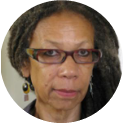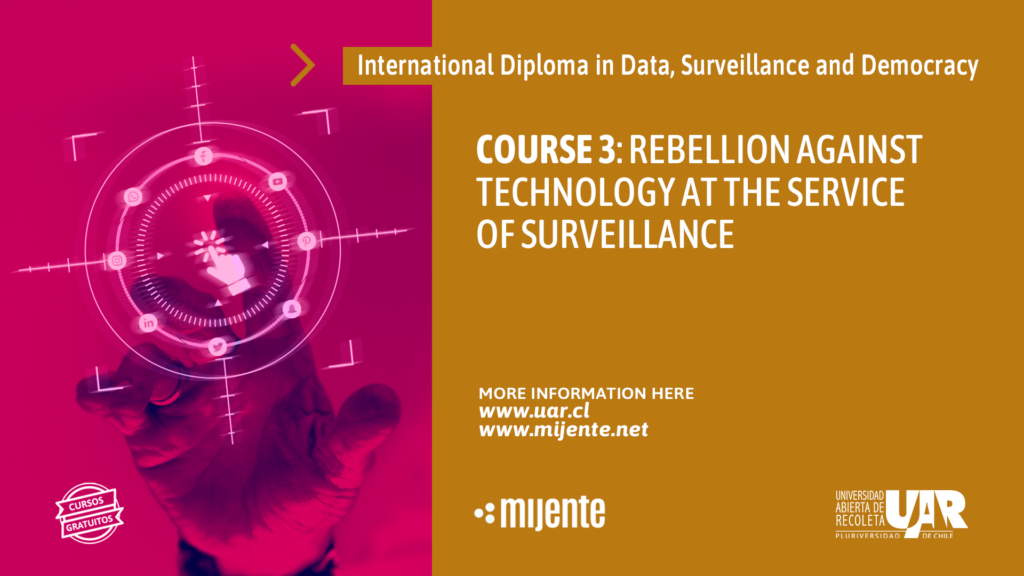Rebellion against technology at the service of surveillance
The Universidad Abierta de Recoleta, in conjunction with the organization MIJENTE, presents the course Rebellion against technology in the service of surveillance, third of the four courses that make up the International Diploma in Data, Surveillance and Democracy.
MIJENTE is a non-profit organization originally from Chicago, United States, established as the political home for Latino and Chicano people who seek racial, economic, gender and climate justice.
The third course of the International Diploma in Data, Surveillance, and Democracy takes a deeper look at the multiplicity of strategies that have built a powerful movement against the ever-expanding state of global surveillance. We will examine histories and systems of policing that dictate particular forms of technology, designed and controlled by big tech and enabled by governments. Immigrants, working class people, and communities of color face human rights abuses and widespread trauma and suffering in the name of lucrative contracts and massive profits.

Characterize theoretical and tangible tools towards neutralizing digital surveillance.

Academics, social organizers and people interested in surveillance. Minimum age: 15 years.

Since these courses are carried out remotely and asynchronously, there is no maximum number of places for them; however, blackout dates have been set to sign up for each one.

The course will be co-certified by the Universidad Abierta of Recoleta and MIJENTE, as long as the approval requirements are met.

This course has no cost of any kind for the participants.
Registration process
From September 5, 2023, to January 10, 2024, until 17:00 p.m. (Chile time).
Minimum capacity
100 participants.
Course start date
Thursday, December 14, 2023 from 5:00 p.m. in Chile.
Course duration
5 weeks.
Estimated dedication time per week
6 hours.
Language
English.
Platform
UAR Digital
Approval requirements
To obtain the certificate of approval, you must submit the final project in week 5.
Teachers

Indian writer and activist based in Vancouver, Canada. Her interests focus on immigration law, indigenous rights advocacy, feminist struggle, anti-racist, imperialist and capitalist movements. She is the author of the books Undoing Border Imperialism (2013), Red Women Rising: Indigenous Women Survivors in Vancouver’s Downtown Eastside (2019) and Border and Law (2022, edited by Green Lightning), as well as co-author of Never Home: Legislating Discrimination in Canadian Immigration (2015). In 2020 she was appointed a director of the British Columbia Civil Liberties Association and has won the Hillman Canada Award for Democracy and Social Justice.
 Program Lead at The Whistle Project, a digital human rights platform based out of the Department of Sociology and the Centre of Governance and Human Rights. He is a Doctoral Candidate in Development Studies at Cambridge, and is particularly interested in the possibilities and challenges these present for refugees and migrants. He is the recipient of an MPhil from Cambridge, and a BA in Politics with Business Management from Queen Mary University of London.
Program Lead at The Whistle Project, a digital human rights platform based out of the Department of Sociology and the Centre of Governance and Human Rights. He is a Doctoral Candidate in Development Studies at Cambridge, and is particularly interested in the possibilities and challenges these present for refugees and migrants. He is the recipient of an MPhil from Cambridge, and a BA in Politics with Business Management from Queen Mary University of London. Digital Organiser at Migrants Organise, an award-winning grassroots platform for migrant justice in the UK. She also organises, researches, and campaigns with No Tech For Tyrants, a student-centred collective working to sever the links between higher education and violent technology. She received a BA in Political Science and Philosophy from Agnes Scott College.
Digital Organiser at Migrants Organise, an award-winning grassroots platform for migrant justice in the UK. She also organises, researches, and campaigns with No Tech For Tyrants, a student-centred collective working to sever the links between higher education and violent technology. She received a BA in Political Science and Philosophy from Agnes Scott College. Journalist collaborator in different media. He is the coordinator of AlgoRace, a team formed by people from the world of communication, anti-racism and AI, which investigates and raises awareness about the role of AI and algorithmic systems in the reinforcement of racism and colonialism. In addition, he leads the anti-discrimination area in the organization Rights International Spain, which works in the defense of fundamental rights, where he investigates racial profiling in the actions of the State Security Forces and Corps.
Journalist collaborator in different media. He is the coordinator of AlgoRace, a team formed by people from the world of communication, anti-racism and AI, which investigates and raises awareness about the role of AI and algorithmic systems in the reinforcement of racism and colonialism. In addition, he leads the anti-discrimination area in the organization Rights International Spain, which works in the defense of fundamental rights, where he investigates racial profiling in the actions of the State Security Forces and Corps. Social Communicator and Master in International Solidarity Action and Social Inclusion by the Carlos III University of Madrid. Ex-president of SOS Racismo Madrid, she analyzes and researches structural racism and its consequences, and teaches training workshops in decolonial thinking. She is currently co-coordinator of AlgoRace, a team formed by people from the world of communication, anti-racism and AI, which investigates and raises awareness about the role of AI systems in the reinforcement of racism and colonialism, and is a columnist in various media.
Social Communicator and Master in International Solidarity Action and Social Inclusion by the Carlos III University of Madrid. Ex-president of SOS Racismo Madrid, she analyzes and researches structural racism and its consequences, and teaches training workshops in decolonial thinking. She is currently co-coordinator of AlgoRace, a team formed by people from the world of communication, anti-racism and AI, which investigates and raises awareness about the role of AI systems in the reinforcement of racism and colonialism, and is a columnist in various media.
She is a graduate of Howard University School of Law and was privileged to clerk for the Honorable Emmet G. Sullivan on the United States District Court for the District of Columbia. A seasoned social fighter and activist, she was an expert consultant, lead researcher and co-author of Amnesty International’s 2005 report Stonewalled: Police Abuse and Misconduct Against Lesbian, Gay, Bisexual and Transgender People in the United States, was a consultant for Caught in the Net, a report on women and the «war on drugs» published by the ACLU, the Brennan Center for Justice and Break the Chains, and co-author of Education Not Deportation: Impacts of New York City School Safety Policies on Immigrant Youth, published by Desis Rising Up and Moving (DRUM).

Is professor of Earth & Environmental Sciences, and American Studies, and the director of the Center for Place, Culture, and Politics. She also serves on the Executive Committee of the Institute for Research on the African Diaspora in the Americas and the Caribbean. Co-founder of many grassroots organizations including the California Prison Moratorium Project, Critical Resistance, and the Central California Environmental Justice Network. Gilmore has lectured in Africa, Asia, Europe, and North America.
 Executive Director and founder of the Surveillance Resistance Lab. For nearly twenty years, Mizue has focused on ending the injustices—including criminalization, imprisonment, and exile—at the intersections of the criminal and migration control systems. Prior to launching the Lab, Mizue was a Senior Advisor at the Immigrant Defense Project (IDP) and the founder and Project Director of the Surveillance, Tech and Immigration Project. Mizue is a co-editor of Resisting Borders and Technologies of Violence (forthcoming from Haymarket Books, Fall 2023).
Executive Director and founder of the Surveillance Resistance Lab. For nearly twenty years, Mizue has focused on ending the injustices—including criminalization, imprisonment, and exile—at the intersections of the criminal and migration control systems. Prior to launching the Lab, Mizue was a Senior Advisor at the Immigrant Defense Project (IDP) and the founder and Project Director of the Surveillance, Tech and Immigration Project. Mizue is a co-editor of Resisting Borders and Technologies of Violence (forthcoming from Haymarket Books, Fall 2023).MIJENTE academic coordination

Mijente campaign organizer. She leads the #NoTechforICE campaign. Previously, she worked at PODER in Mexico, organizing the Sonora River basin committees against water pollution by the mining industry. She was the main organizer of the Labours Congress for the New Orleans Workers’ Center for Racial Justice (2007-2014). In Louisiana, she helped establish a political base of undocumented day laborers and families dedicated to building worker power, promoting racial justice, and organizing against deportation in post-Katrina New Orleans.

Based in Chicago, IL, Cinthya Rodríguez is a national organizer for the NoTechForICE campaign and Mijente, a political home and national organizing center for Chicano and Latino people. Previously, she served as the Organising Director of the United Workers Center where she organized low-wage immigrant workers on the southeast side and the southern suburbs of Chicago. Additionally, she has organized locally around ethnic studies and served as a community educator and interfaith organizer.
Universidad Abierta of Recoleta academic coordination

Graduated in Audiovisual Communication, Audiovisual Communicator with a specialty in screenplay for film and television, and Diploma in Transmedia from the University of Arts, Sciences and Communication. Diploma in Film Script from the University of Chile. Current academic assistant and teaching coordinator of non-contact courses at the Universidad Abierta of Recoleta.




